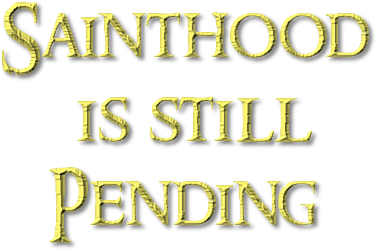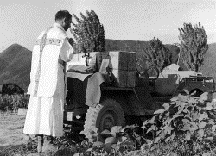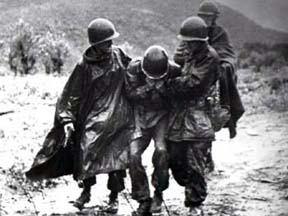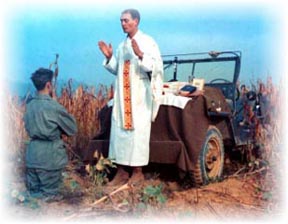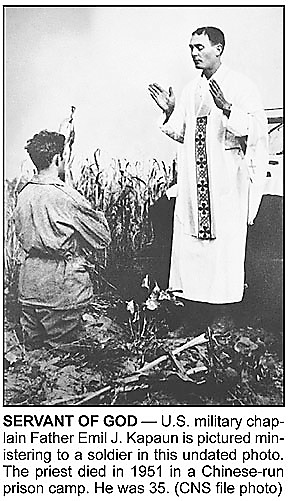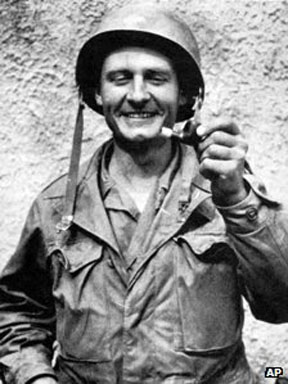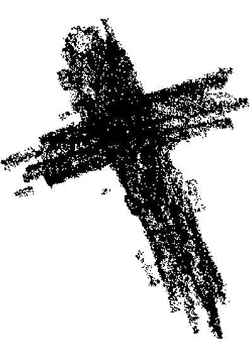
|
UPDATE
3/18/2013 — Kilroy Was Here first recognized this forgotten hero from a forgotten war last year in 2012. Father Kapaun, like other forgotten heroes of this war waited more than 60 years to be remembered. On 11 April 2013. President Obama will present the Medal of Honor posthumously to Father Kapaun through his nephew Ray Kapaun. He is the only seventh Army Chaplain to receive the Medal of Honor since the first in 1861. |
Patrick A. Tillery July 2012
A forgotten place in freezing North Korea — 1 November 1950.
A young Roman Catholic Chaplain celebrated four masses in his 3rd Battalion of the 8th Cavalry Regiment then crawled in his pup tent near Unsan for long overdue rest. He was a veteran of WWII in Burma and India and volunteered for Korea.
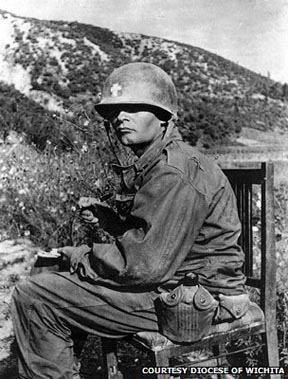 Though he never fired a shot, Father Kapaun saw as much mean action as any man in his unit. Image courtesy BBC News Magazine |
He and his 3rd battalion bedded down in apparent safety; the North Koreans were on the run after the long push up from Pusan. With good reason, most thought the war was as good as won and they would be going home soon . . . maybe in time for Christmas. Douglas MacArthur's message passed mouth to mouth: "Get us to the Yalu by Thanksgiving and you will all be home for Christmas." The only possible concern was . . . would the Chinese enter in war? The generals had already insisted that the Chinese would not; so, to sleep. There were, however, clues that foreshadowed what was about to
happen. A patrol went into the hills and listened to enemy officers
on their radio. When asked, a South Korean replied that he didn't
know what the enemy was saying because they were speaking Chinese.
Intelligence officers scoffed. Other patrols reported that civilians
saw "tens of thousands Chinese" in the surrounding hills.
Intelligence officers scoffed. |
| .A bugle blew — far too
close, and another, then strange ghostly calls from sheep horns blown
by Chinese. Machine guns and mortars soon began firing. Weird music
broke out along with war songs from bugles and thousands of charging
troops. These troops were not pajama clad "volunteers" as
China claimed but well equipped, well-trained regular troops; battle
hardened by war with the Japanese and a bitter civil war. Suddenly
alert, GIs fired flares into the night sky. OMG! The could then see
twenty thousand Chinese soldiers charging right at them. The young Chaplain, now wide awake, was busily running from foxhole to berm dragging wounded back and saying prayers over the dying, hearing confessions |
|
under fire,all the while dressing wounds. Men screamed at him to run, but he ignored them. "I'm going to give you guys the last rites," he said "because a lot of you guys are not going to make it home." He called out the sacred words in English, not Latin. Even as late as November 4th after the 1st, 2nd, and 3rd were overrun and while the 8th Cavalry was being crushed, reports from the 8th about Chinese were met with "There are no Chinese in North Korea." The 1st and the 2nd withdrew South. Most made it as 800 men of 3rd Battalion covered their withdrawal — and then were overrun. For three more days the 3rd fought off attacks. They searched all bodies for more ammo and weapons. Close air support killed thousands but still the Chinese kept |
|
He was awarded the Bronze Star Medal in September 1950 even before this battle and his capture, but his heroism was just beginning. The Chaplain and a doctor set up an aid station in a dugout but all was already lost. Chinese were within feet of the dugout when the Chaplain made a bold move: he spoke to a |
Most of the survivors of the 3rd were captured. They thought this was the end and that they'd be shot now. The enemy in Korea frequently murdered prisoners. Korean winters are bitter cold where temperatures reach 40 degrees below zero Fahrenheit. Even so, the remnants of the 3rd survived a death march. All noted that anyone who couldn't walk and was left behind would be shot. The Chaplain carried one all the way.
|
In the POW camp the Chaplain became the de-facto leader. His efforts managed to make his camp have fewer deaths than the other camps at the time. Their only hope for survival came from the Chaplain's firm teaching "Steal or starve!" He would say they should pray to Dismas, patron saint of thieves, the "good thief" crucified next to Jesus. "Maybe I shouldn't say it," O'Connor (one of the survivors) said in a wire-service story that appeared in The Wichita Beacon, "but he was the best food thief we had."* The Chaplain led secret prayer groups. If they caught him, which they did sometimes, it meant time in a punishment hole, or standing on ice for hours while stripped to the skin. All the time, he dug latrines, mediated disputes, gave away his own food, raised morale among the prisoners, and smuggled dysentery drugs to the aid station. Sadly, the Chaplain developed a blood clot in his leg, dysentery, and pneumonia. Emil Joseph Kapaun (April 20, 1916 – May 23, 1951) died in much the same painful way as many of his beloved flock at the prison camp in Pyoktong, North Korea. He was buried in a mass grave near the Yalu River. Have you ever heard of him? He has been nominated for the Medal of Honor and is in line to be made a saint by the Vatican. The forgotten saint of a forgotten war! The story of Father Kapaun and the quest to elevate him to sainthood began in September 1953. When prisoners who knew him were released at the end of the Korean War, a band of scroungy looking Americans carrying Emil Kapaun's gold ciborium and a rugged wooden |
Upon reaching freedom, they went directly to foreign correspondents covering the prisoner release and said they had a world-class story to tell. Within hours, wire services were sending it worldwide: the story of Father Kapaun, along with photos of Nardella, Joseph O'Connor and Felix McCool holding the crucifix.
|
They told how he'd had tobacco pipes shot out of his mouth as he dragged wounded off battlefields. They said he saved men on the Death March, washed the underwear of the sick, made pans out of roofing tin, and stole food. The Vatican is now examining whether a medical healing that took place in Sedgwick County, Kansas, can be considered a miracle by the Roman Catholic Church. See links below for other miracles being considered by the Vatican. He is on the road to sainthood and would be the third American-born saint. The Roman Catholic Church has declared him a "Servant of God" and he is a candidate for sainthood. In 2000, U.S. Rep. Todd Tiahrt (R-Kan.) began a campaign to award the Medal of Honor to Kapaun. Prior to leaving office on 16 September 2009, Secretary of the Army Pete Geren sent Tiahrt a letter, agreeing that Kapaun was worthy of the honor. Admiral Michael Mullen, chairman of the Joint Chiefs of Staff, also agreed. The current version of the National Defense Authorization Act for Fiscal Year 2012 |
Now you have heard of him! Remember him as well as the other warriors in the Forgotten War, Korea! Thank a Korean War vet. He has been waiting for it more than 60 years. To further the cause, go to http://www.frkapaun.org/
Then go to http://www.change.org/petitions/kilroy-was-here-usps-stamp
and sign the petition to get a Kilroy Was Here commemorative stamp as
one last and lasting tribute to the men who fought the WWII and Korean
Wars.
For further reading see:
|
List of miracles (Wiipedia) Videos
of Father Kapaun miracles KTWU Sunflower Journeys 1610C - Father Kapaun |
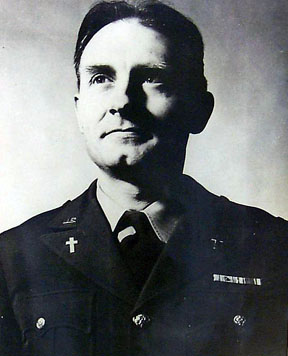 Though he never fired a shot, Father Kapaun saw as much mean action as any man in his unit. Image: BBC News magazine |
*The
Wichita Eagle Website is Dedicated to the Cause of Sainthood for Father Emil J. Kapaun |
Send Corrections, additions, and input to:
|
Visitors since
June 6, 2000 |

